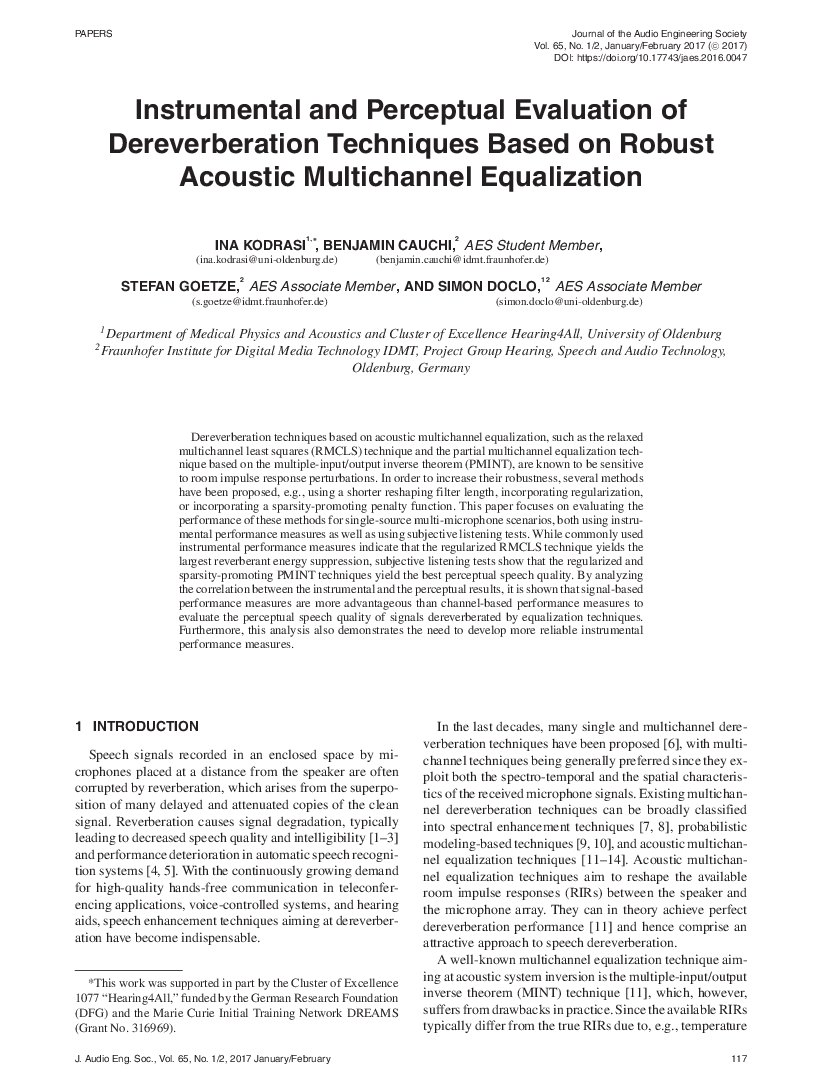Home / Publications / E-library page
You are currently logged in as an
Institutional Subscriber.
If you would like to logout,
please click on the button below.
Home / Publications / E-library page
Only AES members and Institutional Journal Subscribers can download
Speech signals recorded in an enclosed space by microphones at a distance from the speaker are often corrupted by reverberation, which arises from the superposition of many delayed and attenuated copies of the source signal. Because reverberation degrades the signal, removing reverberation would enhance quality. Dereverberation techniques based on acoustic multichannel equalization are known to be sensitive to room impulse response perturbations. In order to increase robustness, several methods have been proposed, as for example, using a shorter reshaping filter length, incorporating regularization, or applying a sparsity-promoting penalty function. This paper focuses on evaluating the performance of these methods for single-source multi-microphone scenarios, using instrumental performance measures as well as using subjective listening tests. By analyzing the correlation between the instrumental and the perceptual results, it is shown that signal-based performance measures are more advantageous than channel-based performance measures to evaluate the perceptual speech quality of signals that were dereverberated by equalization techniques. Furthermore, this analysis also demonstrates the need to develop more reliable instrumental performance measures.
Author (s): Kodrasi, Ina; Cauchi, Benjamin; Goetze, Stefan; Doclo, Simon
Affiliation:
Department of Medical Physics and Acoustics and Cluster of Excellence Hearing4All, University of Oldenburg; Fraunhofer Institute for Digital Media Technology IDMT, Project Group Hearing, Speech and Audio Technology, Oldenburg, Germany
(See document for exact affiliation information.)
Publication Date:
2017-01-06
Import into BibTeX
Permalink: https://aes2.org/publications/elibrary-page/?id=18549
(338KB)
Click to purchase paper as a non-member or login as an AES member. If your company or school subscribes to the E-Library then switch to the institutional version. If you are not an AES member Join the AES. If you need to check your member status, login to the Member Portal.

Kodrasi, Ina; Cauchi, Benjamin; Goetze, Stefan; Doclo, Simon; 2017; Instrumental and Perceptual Evaluation of Dereverberation Techniques Based on Robust Acoustic Multichannel Equalization [PDF]; Department of Medical Physics and Acoustics and Cluster of Excellence Hearing4All, University of Oldenburg; Fraunhofer Institute for Digital Media Technology IDMT, Project Group Hearing, Speech and Audio Technology, Oldenburg, Germany; Paper ; Available from: https://aes2.org/publications/elibrary-page/?id=18549
Kodrasi, Ina; Cauchi, Benjamin; Goetze, Stefan; Doclo, Simon; Instrumental and Perceptual Evaluation of Dereverberation Techniques Based on Robust Acoustic Multichannel Equalization [PDF]; Department of Medical Physics and Acoustics and Cluster of Excellence Hearing4All, University of Oldenburg; Fraunhofer Institute for Digital Media Technology IDMT, Project Group Hearing, Speech and Audio Technology, Oldenburg, Germany; Paper ; 2017 Available: https://aes2.org/publications/elibrary-page/?id=18549
@article{kodrasi2017instrumental,
author={kodrasi ina and cauchi benjamin and goetze stefan and doclo simon},
journal={journal of the audio engineering society},
title={instrumental and perceptual evaluation of dereverberation techniques based on robust acoustic multichannel equalization},
year={2017},
volume={65},
issue={1/2},
pages={117-129},
month={january},}
TY – paper
TI – Instrumental and Perceptual Evaluation of Dereverberation Techniques Based on Robust Acoustic Multichannel Equalization
SP – 117 EP – 129
AU – Kodrasi, Ina
AU – Cauchi, Benjamin
AU – Goetze, Stefan
AU – Doclo, Simon
PY – 2017
JO – Journal of the Audio Engineering Society
VO – 65
IS – 1/2
Y1 – January 2017